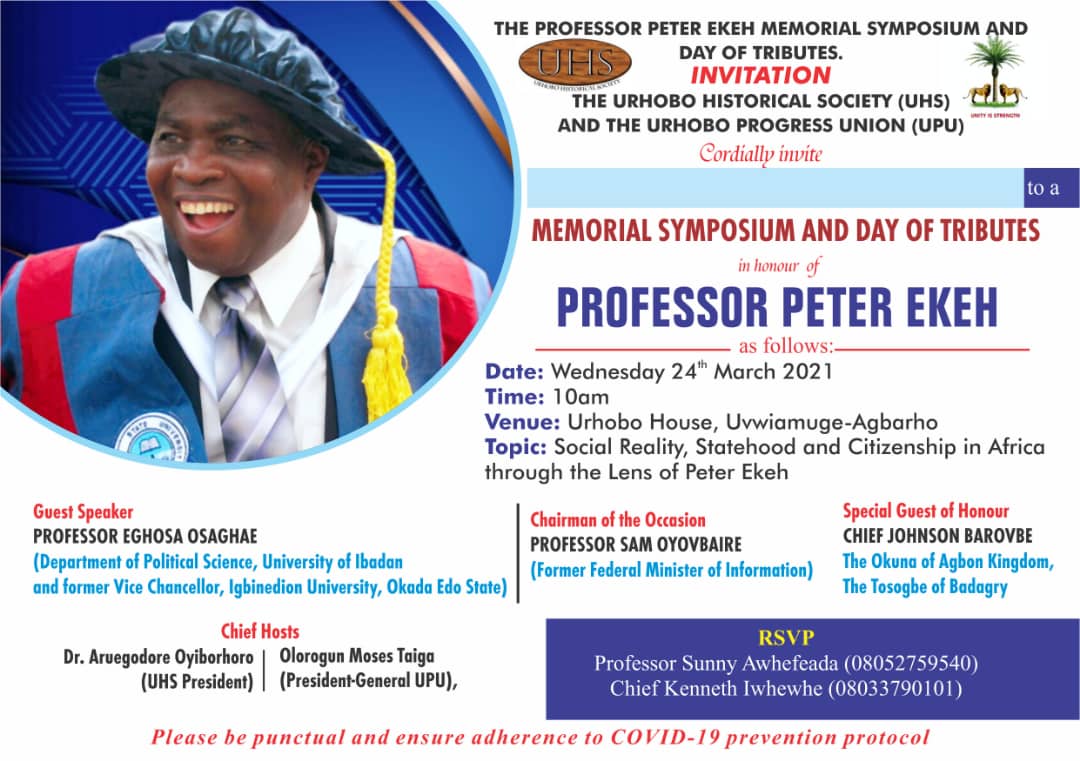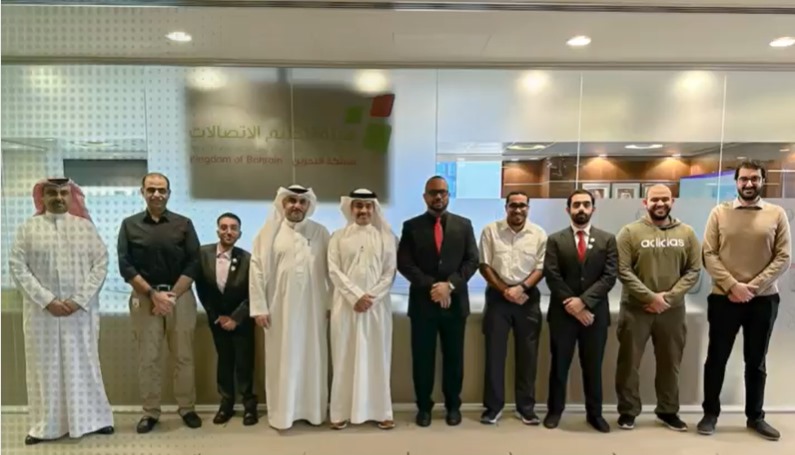By Sunny Awhefeada
A somber ambience was what defined 17th November 2020 for me. It was in that tamed atmosphere that my phone vibrated in its silent mode. The message it delivered was dejecting. The caller simply said “ane Iprofu whunure”. Simply translated to read, “they said Prof has died”. Of course I didn’t need to ask which Prof died. The Prof that has been central to our activities at the Urhobo Historical Society (UHS) was the legendary Professor Peter Ekeh. I went limp as I related the message to a colleague. I made a few calls and lapsed into a mourning mood to bemoan the death of one of the most extraordinary mortals that walked our earth.
Outside, the sun was journeying to the centre of the sky and its confident rays beamed on the world. But the effect of the message I just got had the better of me. Then memories and memories took over. A man with a bouncy gait, cherubic face almost like that of an innocent child, clad in dark suits was introduced as the guest speaker. He mounted the podium and delivered a profoundly brilliant and unforgettable lecture in a tone that was not only self-assured, but evident of great erudition. As he concluded the lecture, the auditorium rose in loud approbation and the gentle smile that was permanently etched on his face broadened as the satisfied audience swooped on him in handshake after handshake. That man was Professor Peter Palmer Ekeh delivering a public lecture at the Petroleum Training Institute (PTI) Conference Centre, Effurun in November 2001. That first encounter with Professor Ekeh left a great impression on me and the infinite possibilities inherent in the future.
Born in 1937 at Adarode a small hamlet in Okpara inland, the story of Professor Ekeh befits an epic plot. His grandfather was the ruler of Imodje-Orogun a sub-unit of the warlike Orogun clan. An internecine strife forced the family to flee. A period of peregrination saw the family settling down at Okpara where his own father, Ekeh Okoro-afor, founded Adarode where Peter was born.
His father named him Palmer after I. T. Palmer, an agent of the Royal Niger Company who helped in establishing churches and schools in parts of Urhoboland. Ekeh’s father reckoned with the influence of names in lives of men and envisaged his son as another Palmer who will do exploit with education. The Catholic School named him Peter and thus the nomenclatural making of Peter Palmer Ekeh.
A whiz-kid, the young Peter was academically nonpareil throughout his primary school days at Okpara. He was Peter at school, but Palmer in the community. He crowned his primary school years as the General Monitor with John Kingsley Onigu Otite and Chamberlain Orovwudje as his contemporaries. The former became the famed University of Ibadan sociologist, Professor Onigu Otitie, while the latter became the monarch of Agbon Kingdom as Ogurimerime Okpara I. The young Peter went on to achieve an unrivalled academic feat at St. Peter Claver’s College (SPCC), Aghalokpe. After a stint of teaching Latin, his favourite subject, in a secondary school, he proceeded to the University of Ibadan to study Sociology in the Faculty of the Social Sciences.
Ekeh’s academic sublimity was again on display at the University of Ibadan when he finished as the best graduating student in the entire Faculty of the Social Sciences in 1964. That feat earned him not just garlands, but scholarship that saw him going to the United States of America for further studies.
From Stanford to California, the Okpara-born, Orogun-sired Peter Palmer shone like a star. His essays, thesis and dissertation easily marked him out as a scholar and theorist of great promise. After teaching for a year, he yielded to the homecoming pull and berthed at the Ahmadu Bello University, Zaria. In 1974, his friend and redoubtable political scientist, Professor B. J. Duddley invited him to join the Department of Political Science at the University of Ibadan and thus Ekeh became a don in his famous alma mater.
Ekeh joined the teaching staff of the University of Ibadan fully made. His chart bursting essay “Colonialism and the Two Publics in Africa: A Theoretical Statement” was published in 1975 to global acclaim. He made the professoriate in 1978 the same year he became the Head of the Department of Political Science. His 1983 inaugural lecture titled “Colonialism and Social Structure”, like his earlier submission on the “two publics”, charted new theoretical perspectives in the Social Sciences and allied disciplines. From his Ibadan post, Ekeh engaged the world of scholarship and attained global visibility. He was in the galaxy of social science firmament. He was a great writer who wrote in sublime style. His essays are limpid, fluid and mellifluous. Sadly, the brain drain of the late 1980s saw him relocating to the United States from whence he came fifteen years earlier. It was sunset for the Nigerian university system.
Professor Ekeh was prodigiously brilliant, but disarmingly humble. A permanent smile that put the world around him at ease lit up his face. His disposition to things was not only inspiring, but reassuring. He seemed to have a solution for everything. He was profound in thought. His intellect was penetrating and sharp. Honesty and integrity were his watchwords. I began private conversations with him in 2007 and the experience was as humbling as it was ennobling. My work with him was to help consolidate the Urhobo Historical Society (UHS) headquarters at Okpara-inland. He had, together with other Urhobos, founded the UHS in 1999 from his base in America. He not only hosted UHS conferences overseas and in Nigeria, he also published many books and essays which breathed academic life into Urhobo history and culture. The UHS website and Urhobo history and culture museum rank among the richest sites in the domain of ethnic studies. Having attained the zenith of global academic pursuits, Ekeh devoted his cosmopolitan acquisition to the excavation and propagation of Urhobo history and culture. That was the whole essence of the UHS. I was fortunate to have had many conversations with him physically, through emails and phone calls. Each conversation we had was always like a seminar opening up new vistas for me. Even when such conversations derived from the past, they really looked into the future.
Professor Peter Palmer Ekeh’s story truly approximates the epic. From the dimness of Adarode in Okpara where he was born eighty-three years ago, he rode the daunting waves of colonial education and obtained the Golden Fleece. His impact on the world of scholarship is in the realm of the extraordinary. A pioneer in every sense, he emerged as an intellectual giant and metamorphosed into a myth. He once told me the story of how a scholar at a conference he also attended referred to him as “the late Peter Ekeh” thinking that he was dead. He walked up to the fellow with a smile and told him that he was Peter Ekeh and that he was not dead. Yes, Professor Peter Palmer Ekeh is not dead. Only his physical presence took leave of us to rest in Erivwin. I still feel his compelling presence. I see his smiling face. His voice rings in my ears. His works and legacies will outlive him and give him life for as long as life endures.
Aridon akpokedefaoooo





